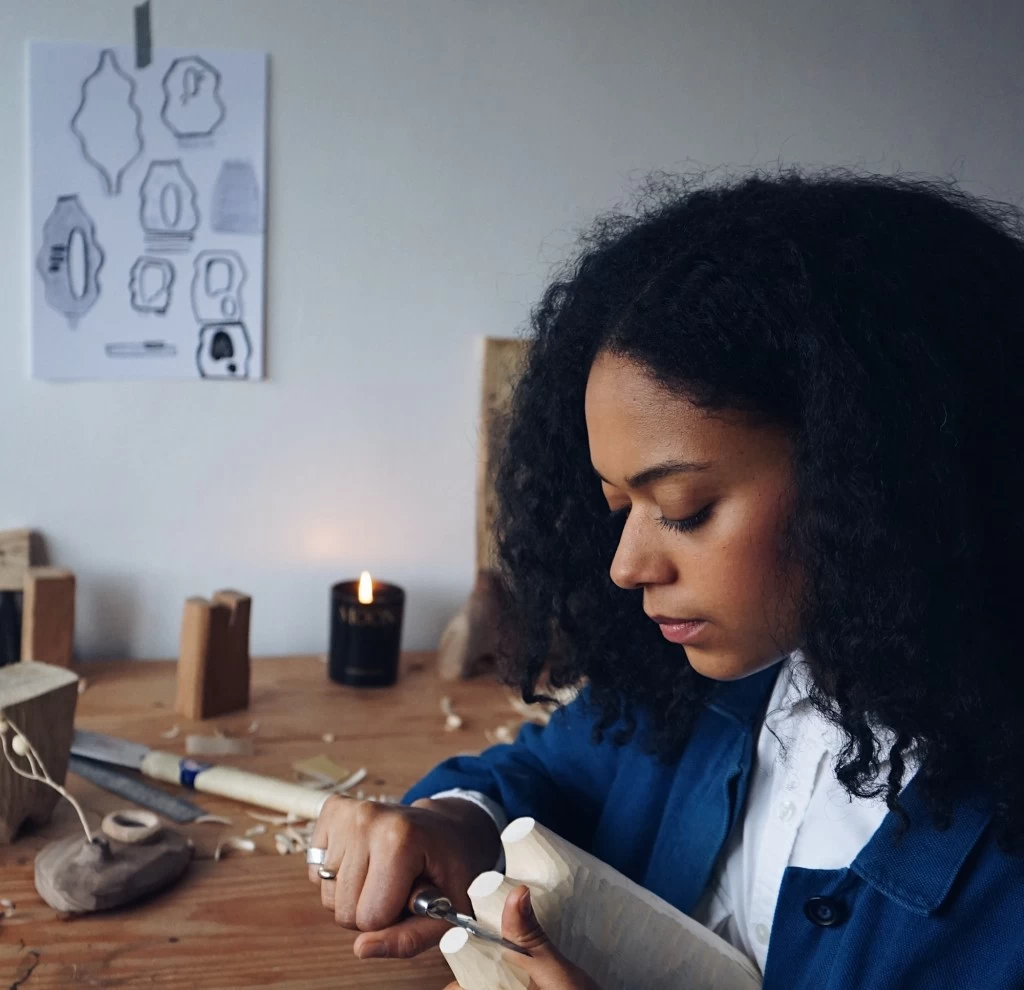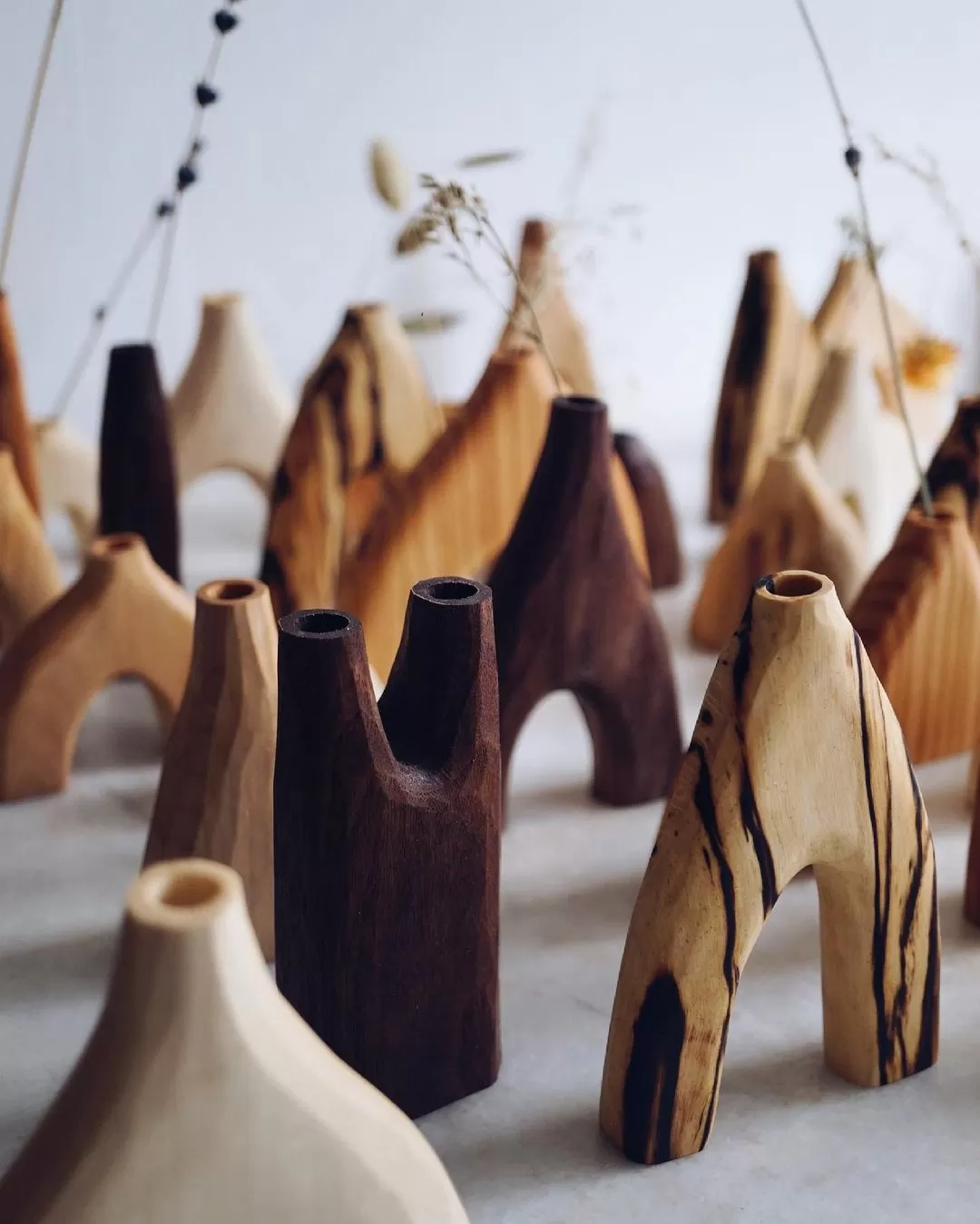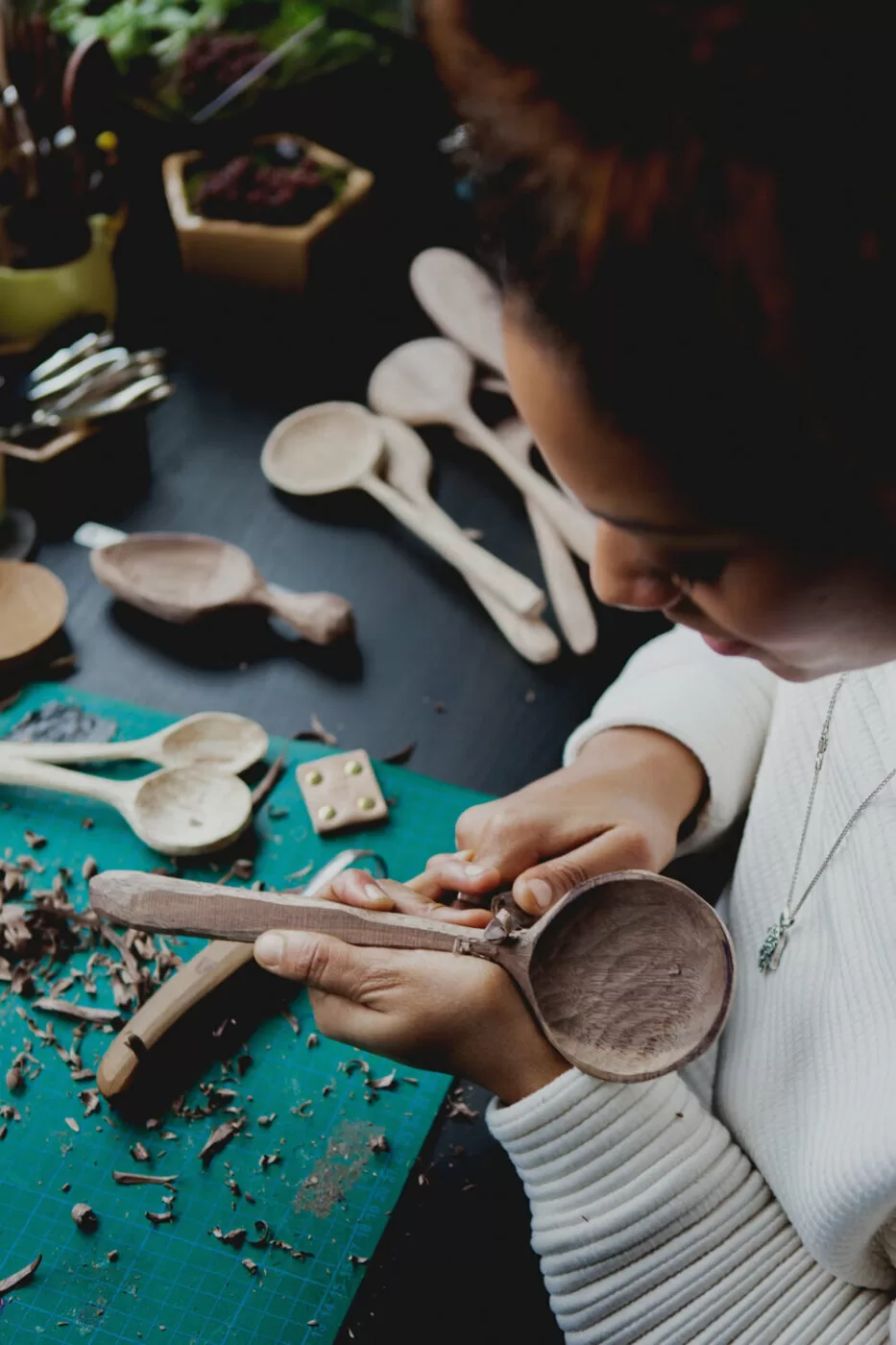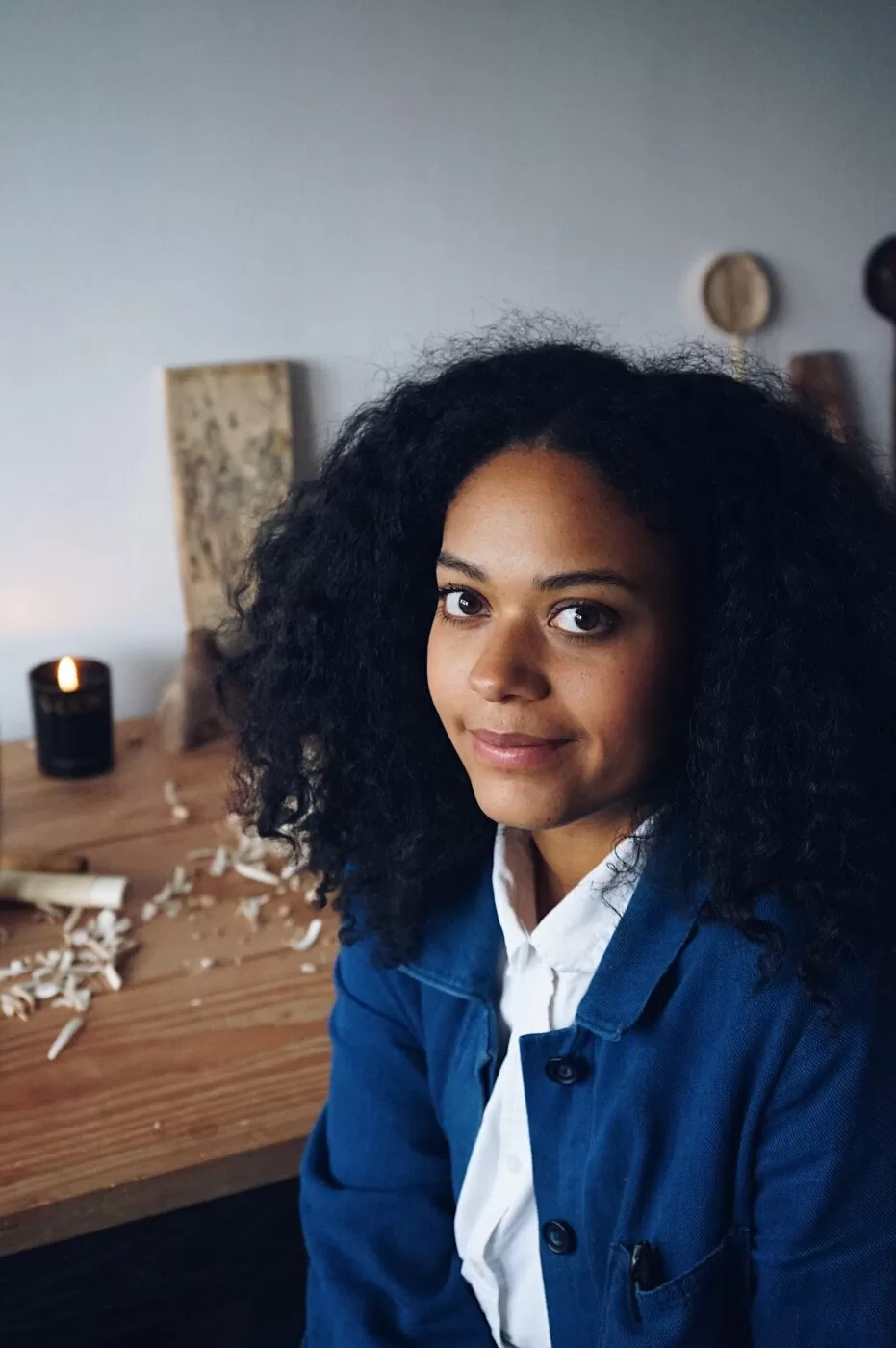NEXT DROP 6TH MARCH 7AM. JOIN CLUB HOLLY & CO FOR ACCESS

The slow and steady route to a self-sufficient business
feeling uninspired
With Sophie Sellu, founder of Grain & Knot
UPDATED 3RD OCTOBER 2023
How do you build a self-sufficient business? How do you manage to stick to your guns about working slowly, even if it means making less? Sophie Sellu’s journey is fascinating for anyone determined to follow their purpose.

Meet Sophie Sellu, wonderful wood carver and founder
The path to purposeful creation has been a winding one for Independent Award Winner and founder of Grain & Knot, Sophie Sellu. From training as an interior designer to being made redundant not just once, but twice, Sophie has remained resilient and listened to the quiet voice within to stay strong when things got tough.
After a casual conversation about a wood-carving course, she got herself a place within days. She loved how it offered the perfect outlet for her design skills and her passion for the natural world. Then a passing comment inspired Sophie to apply for the Enterprise Programme with the Prince’s Trust. On completion, she won funding, which she combined with her redundancy money to set up her wood-carving workshop — and that’s where her passion began.
How to grow a business (slowly and carefully)
A firm believer in starting things small, Sophie kept her overheads low by building her own website and roping in friends to help with graphic design and photography. She also gave herself a time limit to see what she could achieve and avoid pouring money into something that wasn’t working. “I said to myself: Right, if I’m not selling my stuff in six months, I will look for a proper job.”
But she did start selling pieces, though like many makers, she had to confront the question of why her handmade products command the price that they do. The time invested in crafting an item is the obvious answer, but Sophie’s response is simple — if you’re prepared to invest in a cooking pot which will last, why wouldn’t you spend money on a wooden spoon that’s built to last, too? “If you really enjoy cooking, why not elevate that experience and have a spoon which is a joy to use every day and is beautifully tactile? I think with everyone spending more time at home, people are aware of the fact that they would like that unique thing that would brighten their day slightly.” Which makes perfect sense.
"I said to myself: Right, if I’m not selling my stuff in six months, I will look for a proper job."
True heritage crafts: why it pays to take the artisan approach
Sophie has also had to justify her less-than-traditional, but progressive and sustainable, techniques — from using reclaimed wood rather than green wood (freshly cut timber), to incorporating machinery in the initial stages of crafting, which speeds up the process.
“It takes me less than a minute to cut out a piece of wood with a bandsaw, yet it could take 45 minutes using an axe. So, the luddite version of that is that it’s not handmade because I’m not doing every part with my hand — that didn’t make any sense to me because my hand is using the machinery and I’m using one piece of machinery.” It’s a practical hack that makes good business sense. But in a world where it feels like things are getting faster every day, Sophie’s focus is on the slower way of doing things and producing a limited number of artisan products — which thankfully, more and more customers are starting to appreciate as they can see the clear benefits. And if you look out for our badges, your can see the products on our site that are made by hand or in the UK.
“With Amazon, there’s a sense that everything is available now,” says Sophie, “And my products aren’t always available. I normally do six shop updates a year. I always say, trees take so long to grow, why rush it? Since the pandemic, people are more prepared to wait.”
Find a way of working that works for you
Sophie has been making soulful, unique hand carved objects since 2013, yet her success didn’t come overnight and it took a while to work out the best way of working. By trialling limited shop updates and calculating the amount she makes from those updates, she’s developed a good idea of what her income will be, which gives her a sense of security. It’s a rhythm that works for her and which she’s honed after coming close to burnout while teaching workshops.
The physicality of her work meant that on some mornings, she was waking up in pain. At these points, she could have fallen out of love with wood carving, but she re-assessed and went back to basics — back to making it not feel like work. Sometimes the slow ways are the best ways, and it’s so inspiring to see such a successful maker advocating them.

In a world where it feels like things are getting faster every day, Sophie’s focus is on the slower way of doing things and producing a limited number of artisan products.

Key takeaways:
If you want to build a business up slowly and take your time to craft products soulfully, sustainably and with purpose, there are three main points to remember.
1. Take your time:
It can be good to build a business slowly and work in a way that works for you — and Sophie’s 10 years in business is proof that it’s possible.
2. Know your audience:
Sophie says, “The first few markets I did, I remember people coming up to me and saying, ‘You do know you can buy this in IKEA for a pound, don’t you?’ and it would just be like a stab to the chest. I had to say to myself, ok, well you’re not my market, you’re not my audience, you don’t understand what’s gone into this and how it benefits the planet, and that’s fine.”
3. Keep things manageable:
Sophie says, “You do need to make money, but I used to have my shop open all the time and it just didn’t suit my lifestyle, it was disrupting my creativity. Once I started focusing on smaller collections, I could slimline the whole process rather than spreading myself too thin. Fewer updates allow me to focus on making things and having that slower pace of life.”
Related content
MORE ARTICLES BY EMOTION

How to stay creative and resourceful under pressure
Mental Wellbeing

Why innovation is important in business and the best way to innovate
Product & Innovation

The golden age of redundancy: is redundancy a blessing in disguise?
Feeling uninspired

Why entrepreneurship is the new women’s movement
Starting out

Achieving work-life balance: how I found my good life
Feeling uninspired

You are your brand — stand out!
Brand & Purpose

Why I believe in living a life less ordinary
Feeling Uninspired
Be the first to know
Sign up to our emails for brand new small business magic and inspiration. And if you create an account, you’ll also get exclusive product drops, discounts and more from Club Holly & Co, too.
